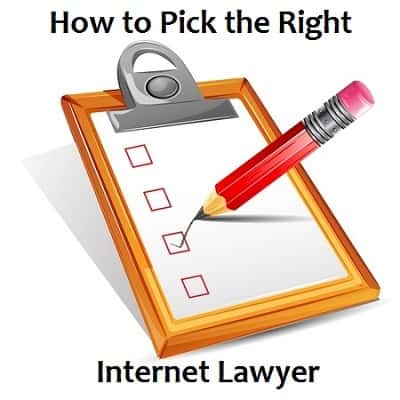3. What Size Internet Law Firm Is Right For You?
 Want to scare the pants off of someone in an Internet business dispute? Hire one of the largest law firms in the world and have a nasty letter sent to that person on stationery that lists at least a dozen locations for that law firm around the world. Bonus points if the law firm’s website lists more than a 1,000 attorneys working for it globally. It’s like you’ve inflicted a plague of lawyers on your opponent.
Want to scare the pants off of someone in an Internet business dispute? Hire one of the largest law firms in the world and have a nasty letter sent to that person on stationery that lists at least a dozen locations for that law firm around the world. Bonus points if the law firm’s website lists more than a 1,000 attorneys working for it globally. It’s like you’ve inflicted a plague of lawyers on your opponent.
This is one of the best uses for a large law firm…scare someone into doing the right thing out of fear. Your big business attorney probably will not know Internet law. It’s just mistakenly assumed to be the case by the person who receives the letter you paid to have sent.
What’s the Risk?
If the other side decides to fight, you will probably pay a fortune in legal fees. Big law firms have large overhead costs. They rent premium office space with nice downtown views, many support staff salaries, country club dues, and lots of other costs most law firms never pay.
Because of these extra expenses, you can expect to pay a large law firm 2 to 3 times what an Internet lawyer working at a smaller law firm charges. Internet attorneys are not cheap — so it rarely makes sense to pay extra simply because the firm is large with lots of expenses that don’t directly benefit you.
Education Costs
There are also the hidden “education” costs you get with large law firms. As discussed before, many business lawyers don’t know Internet law…and that’s true in large law firms too. The difference is that you’re paying at least twice as much for lawyers in that big firm to learn what an experienced Internet attorney already knows.
Time Costs
 In addition, there’s the extra time factor.
In addition, there’s the extra time factor.
Junior attorneys with 6 or 7 years of “experience” at a large law firm may never have tried a case in court, drafted an e-commerce contract from scratch, or negotiated any online business deal. Some serve as gofers or paralegals for senior attorneys instead of being real lawyers practicing law.
If you’re involved with a lawsuit or need Internet legal documents drafted, these junior attorneys will take more time than an Internet lawyer at a small law firm that does this type of work nearly every day.
Junior attorneys at big law firms often have their work reviewed by a senior lawyer. So, in addition to paying for the junior lawyer’s education and extra time, you’ll probably pay additional fees for the time it takes for a senior lawyer to review the work…and you better hope the senior attorney knows something more about the Internet than how to send and receive email.
When Should You Retain a Big Law Firm
So when should you consider using a big business law firm instead of an Internet lawyer at a smaller e-commerce law firm?
There are two common situations.
First, there’s the “fear factor” scenario described above. This works when you’re trying to scare someone into doing the right thing. But for it to work, your opponent must be small and smart enough to fear going up against the big firm. If you can’t afford to pay the big law firm for more than sending that letter, it’s a bluff so use this tactic wisely.
Second, when your Internet business becomes large enough that you’re considering going public or selling out for a fortune, it’s probably time to bring in a big firm to handle securities law and related issues. The large firm may not know Internet law but it will have lawyers who can guide you through the process of taking your company public or cashing out.
Hint. When lawyers for a large publicly traded company (e.g. Apple or Google) come knocking on your door with a buyout offer, that’s a good sign it’s time for you to get a big law firm involved to represent you as you either sell or take the company public.
On the other hand, if you’re paying for a big law firm to represent your company on an ongoing basis, but there’s no reason to do so, you’re essentially burning money. You’re overpaying for an expensive ego trip…

